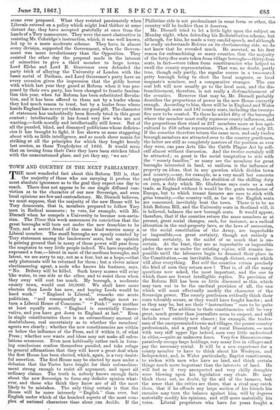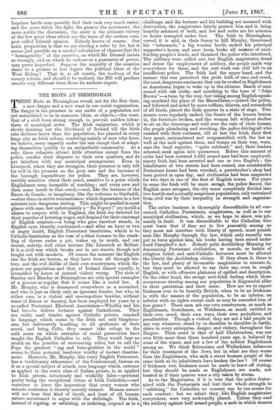'TOWNAND COUNTRY IN THE NEXT PARLIAMENT.
THE most wonderful fact about this Reform Bill is, that the majority of those who are carrying it profess the most absolute ignorance as to the goal they expect one day to -reach. There does not appear to be one single diffused con- viction as to the character of our new Sovereign, and even 'local opinions are few and contradictory. Mr. Disraeli believes, we must suppose, that the majority of the new House will be Tory democrats, that is, members prepared to follow Tory men in Radical measures ; to vote, for example, with Mr. -Disraeli when he compels a University to become non-secta- Tian. The Times this week announces its conviction that the great boroughs will turn out under the new franchise to be 'Tory, and a secret dread of the same kind worries many a -Liberal member. The small boroughs are openly counted by `Tory statesmen among the landowners' seats, but an opinion is gaining ground that in many of them power will pass from 'the magnates to very little people indeed. We have repeatedly expressed a fear,—latent in most of the medium boroughs, and latent, we are sorry to say, not as a fear, but as a hope,—that only plutocrats will be returned for them ; but a clever minor -electioneering agent, a mole who knows his business, says, No. Bribery will be killed. Such heavy masses will sway like water, to one side or the other, and to resist them when they sway will cost too much. My borough, a moderate county town, would cost 50,0001. We shall have more -electors than Leeds has now, and buying Leeds would be lard work." " England is Liberal," remarks one acute -politician, " and consequently a wide suffrage must re- turn a Liberal House of Commons." " Pooh ! " says another at least equally acute, " England is essentially Conser- vative, and you have got down to England at last." Even in single constituencies there is an extraordinary amount of doubtfulness, real uncertainty as to whether the members' agents see clearly ; whether the new constituencies are within or below the influence of the Press, and if within it, of what Press ; whether new wants and ideas may not make all calcu- lations erroneous. Even men habitually rather rash in form- ing conclusions confess themselves puzzled, and take refuge in general affirmations that they will know a great deal when the first House has been elected, which, again, is a very doubt- ful assertion. The first House may be elected by men under a delusion that the Tories have fought for their enfranchise- ment strong enough to resist all argument, and upset all ordinary claims. The truth is, nobody knows enough facts about the new Sovereign to form any definite opinion what- ever, and those who think they know are of all the most likely to be mistaken. The only thing certain is that the House will be more intensely " English " than ever, but English under which of the hundred aspects of the most com- plex of national characters time alone can decide. If the
Philistine side is not predominant in some form or other, the country will be luckier than it deserves.
Mr. Disraeli tried to let a little light upon the subject on Monday night, when defending his Redistribution scheme, but although, for him, he made a very candid speech, and although he really understands Reform on its electioneering side, we do not know that he revealed much. He asserted, as his first reason for enfranchising so many counties, that the majority of the forty-five seats taken from village boroughs—thirty-four seats, in fact—were taken from constituencies who helped to swell the county representation. That was, no doubt, partly true, though only partly, the regular course in a two-seated petty borough being to elect the local magnate, or local magnate's nominee, and a comparative stranger. The one seat. left will now usually go to the local man, and the dis- franchisement, therefore, is not really a disfranchisement of the counties. However that may be, Mr. Disraeli probably describes the proportions of power in the new House correctly enough. According to him, there will be in England and Wales 308 borough seats and 187 county seats, including the twenty- five now to be created. To these he added fifty of the boroughs where the member must really represent county influences, and the proportions then stand as 237 members more or less agri- cultural to 258 urban representatives, a difference of only 23. If the counties therefore return the same men, and only twelve borough members are attracted over to the country gentlemen, the latter are still as completely masters of the position as ever they were, can pass Acts like the Cattle Plague Act by roll- call almost without discussion. And the twelve certainly will be attracted ; so great is the social temptation to side with the " county families," so many are the members for great boroughs interested in land, so uniform is the influence of property on ideas, that in any question which divides town and country,—say, for example, as a very small but concrete and appreciable illustration, the abolition of the shilling duty on corn, a duty which Mr. Gladstone says costs us a vast trade, as England without it would be the grain warehouse of Europe, but to which tenant farmers are sure to stick with grim tenacity,—the country will, as far as the English seats are concerned, inevitably beat the town. There is to be no Irish Reform Bill, and the University seats in Scotland will, it is believed, balance the new borough seats. It would appear, therefore, that if the counties return the same members as at present, great social changes, such, for instance, as a radical alteration in the real-property laws, or the laws of succession, or the social constitution of the Army, are improbable or impossible,—a great certainty, though not entirely a pleasant certainty, in the midst of so much that is un- certain. At the least, they are as improbable or impossible under the new as under the existing regime, will remain im- possible until the labourers begin to demand their place in the Constitution,—an inevitable, though distant, event which will alter everything. But will the counties return precisely the kind of men they return now ? That is, of all the many questions now asked, the most important, and the one to which there are fewest intelligible replies. No provision of the Reform Bill has been so little discussed as this, which may turn out to be the cardinal provision of all, the one which will most effectually modify the character of the Sovereign power. The county gentlemen evidently think their seats tolerably secure, or they would have fought harder ; and so they may be, but are their " instructions " sure to be quite the same ? The addition to their constituencies will be very great, much greater than journalists seem to suspect, and will include some entirely new classes ; for example, the trades- men of the unrepresented towns and villages, the poorer country professionals, and a great body of rural Dissenters, — men with very stiff upper lips indeed, men very little understood in cities,—quite an unknown force. Very few Dissenters com- paratively occupy large holdings, very many live in villages and pay the necessary rental. It will be a new experience for a county member to have to think about his Wesleyan, and Independent, and, in Wales particularly, Baptist constituents, to reckon with men who have no land, and think certain things much more important than the interests of land. He will feel as if very unexpected and very chilly draughts were blowing upon his legislative easy chair. He may block them out, no doubt, by the aid of the farmers, but the sense that the critics are there, that a rival may catch them, that if he offends any large section of his friends his enemies may turn the balance against him, will by degrees materially modify his opinions, and still more materially his votes. Liberal proprietors who have for years fought a hopeless battle may possibly find their task very much easier, and the more bitter the fight, the greater the movement, the more public the discussion, the surer is the ultimate victory of the few great ideas which are the bases of the curious com- post called Liberal opinion. Nobody knows of course. Our main proposition is that we are electing a ruler by lot, but it seems just possible on a careful calculation of chances that the " homogeneity " of the counties, on which Mr. Disraeli insists so strongly, and on which he reckons as a guarantee of power, may prove imperfect. Suppose the majority of the counties share to a greater or less degree the political ideas of the West Riding ? That is, at all events, the tendency of the county reform, and should it be realized, the Bill will produce results very different from those its authors expect.































 Previous page
Previous page